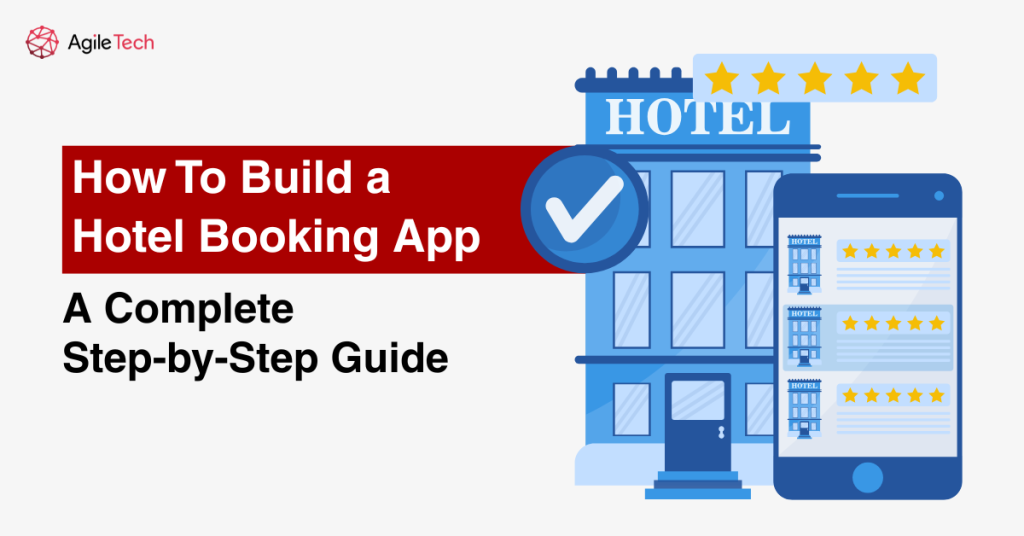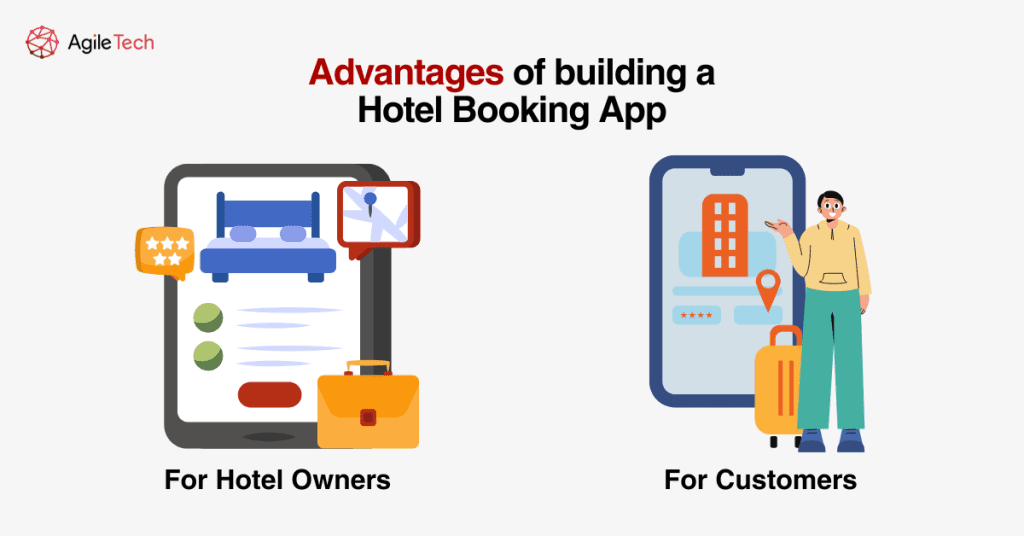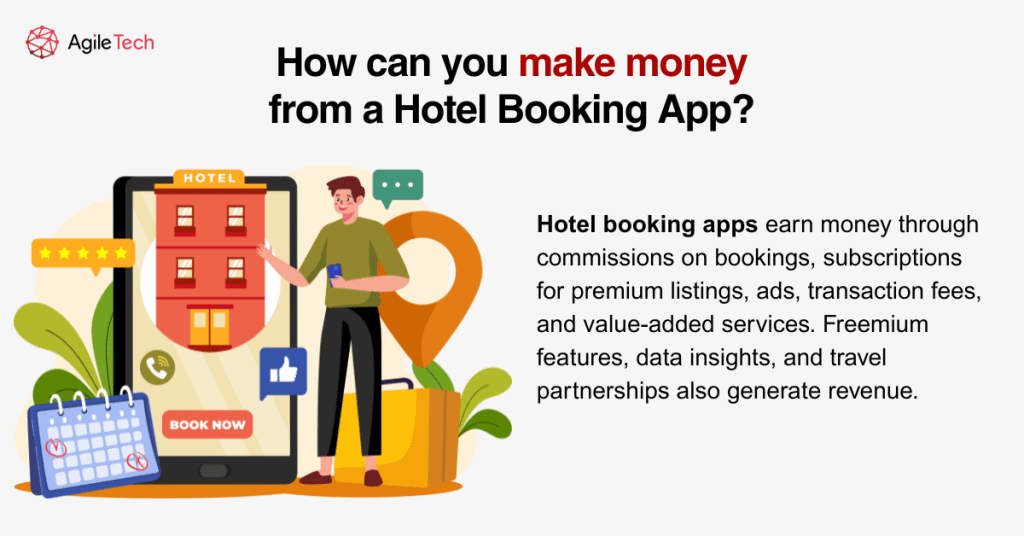How To Build a Hotel Booking App in 2025: A Complete Step-by-Step Guide
The hospitality industry has undergone a digital transformation, with mobile booking apps becoming the primary channel for hotel reservations. In 2025, developing a successful hotel booking app requires understanding market dynamics, user expectations, and emerging technologies. This comprehensive guide will walk you through every aspect of creating a competitive hotel booking application.

- 1. Hotel Booking App
- 2. Advantages of building a Hotel Booking App
- 3. Something you should consider before starting to develop
- 4. Must-have features needed to be included
- 5. Steps of developing a hotel booking app
- 6. Tech Stack
- 7. How much does it take to build a hotel booking app?
- 8. How can you make money from a Hotel Booking App?
- Conclusion
1. Hotel Booking App
1.1. Overview
A hotel booking app is a mobile application that connects travelers with accommodation providers, enabling users to search, compare, and book hotels directly from their smartphones. These platforms have revolutionized the hospitality industry by offering instant booking capabilities, real-time availability, and personalized travel experiences.
In 2025, hotel booking apps have evolved beyond simple reservation tools to become comprehensive travel companions, integrating features like AI-powered recommendations, virtual tours, contactless check-ins, and sustainable travel options. The global online hotel booking market is projected to reach unprecedented heights, making this an opportune time for entrepreneurs and businesses to enter the space.
1.2. Types of Hotel Booking Apps
Marketplace Apps (B2C2B): These platforms aggregate multiple hotels and allow users to compare prices and amenities. Examples include Booking.com, Expedia, and Agoda. They earn through commission fees from hotels and offer the widest selection to users.
Chain-Specific Apps (B2C): Developed by hotel chains for their properties, these apps focus on brand loyalty and direct bookings. Examples include Marriott Bonvoy, Hilton Honors, and IHG One Rewards. They offer exclusive deals and loyalty program integration.
Boutique/Independent Hotel Apps: Individual hotels or small chains create these apps to establish direct relationships with guests and reduce dependency on third-party platforms. They often feature unique, personalized experiences.
Corporate Booking Apps (B2B): Designed for business travelers and corporate accounts, these apps integrate with expense management systems and offer corporate rates and reporting features.
Niche Market Apps: Specialized platforms focusing on specific segments like luxury hotels, budget accommodations, eco-friendly stays, or unique experiences like glamping or treehouses.
1.3. How does a hotel booking app work?
The hotel booking app ecosystem operates through a sophisticated network of integrations and processes:
Search and Discovery Phase: Users enter their destination, check-in/check-out dates, and guest count. The app queries integrated hotel management systems and third-party APIs to retrieve real-time availability and pricing information.
Filtering and Comparison: Advanced algorithms sort and filter results based on user preferences, price ranges, amenities, and location. Machine learning enhances recommendations based on user behavior and preferences.
Booking Process: When users select a hotel, the app initiates a reservation request through the hotel’s property management system (PMS) or channel manager. Payment processing occurs through secure gateways, and confirmation details are sent to both the user and the hotel.
Integration Layer: The app connects with multiple systems, including Global Distribution Systems (GDS), Central Reservation Systems (CRS), payment gateways, review platforms, and mapping services to provide comprehensive functionality.
2. Advantages of building a Hotel Booking App

2.1. For Hotel Owners
Direct Booking Revenue: Hotels can bypass third-party commission fees (typically 15-25%) by encouraging direct bookings through their own apps. This significantly improves profit margins and provides better control over pricing strategies.
Enhanced Customer Relationships: Direct communication channels enable hotels to build stronger relationships with guests, gather valuable feedback, and create personalized experiences that foster loyalty.
Data Ownership and Analytics: Hotels gain access to comprehensive guest data, booking patterns, and preferences, enabling data-driven decision making for marketing, operations, and service improvements.
Operational Efficiency: Automated booking processes reduce manual workload, minimize booking errors, and streamline check-in/check-out procedures through digital solutions.
Marketing Control: Hotels can implement targeted marketing campaigns, promotional offers, and loyalty programs without competing with other properties on third-party platforms.
2.2. For customers
Convenience and Accessibility: 24/7 booking capability from anywhere, with instant confirmation and easy modification options. Mobile apps provide a superior user experience compared to websites.
Personalized Experience: AI-driven recommendations based on travel history, preferences, and budget constraints help users discover relevant accommodations quickly.
Exclusive Deals and Rewards: Direct booking apps often offer special rates, loyalty points, room upgrades, and exclusive amenities not available on third-party platforms.
Integrated Services: Modern apps provide comprehensive travel solutions, including local attractions, transportation booking, restaurant reservations, and concierge services.
Transparency and Trust: Direct communication with hotels, authentic reviews, virtual tours, and detailed property information help users make informed decisions.
3. Something you should consider before starting to develop
Before diving into hotel booking app development, comprehensive strategic planning forms the foundation for long-term success. Market research and competition analysis should be your starting point, involving a thorough examination of existing competitors to identify market gaps and understand your target audience’s specific pain points. Study successful applications to learn from their strengths while identifying weaknesses you can improve upon.
Business model selection critically shapes your entire development approach, whether you choose to create a marketplace platform connecting multiple hotels, a chain-specific application, or a niche-focused solution targeting specific market segments. Each model demands different technical architectures, partnership strategies, and revenue generation methods. Understanding legal and compliance requirements early prevents costly modifications later, as you’ll need to address data privacy regulations like GDPR and CCPA, payment processing standards including PCI DSS compliance, accessibility requirements under ADA guidelines, and various consumer protection laws across your target markets.
Scalability planning ensures your application can grow with your business, requiring careful consideration of cloud infrastructure, database optimization strategies, and third-party integration capabilities that can handle increasing users, bookings, and geographic expansion. Your partnership strategy should establish relationships with hotels, payment processors, technology providers, and potentially Global Distribution Systems or Online Travel Agencies for inventory access. Budget and timeline estimation require a realistic assessment of development costs, which typically range from $50,000 for basic applications to over $500,000 for comprehensive platforms, while factoring in ongoing maintenance, marketing, and operational expenses. Finally, technology stack selection should align with your scalability requirements, development team expertise, and long-term maintenance capabilities to ensure sustainable growth and efficient operations.
Read more: Best Web for Hotel Booking with 10,000+ Reservations Monthly
4. Must-have features needed to be included
User Authentication and Profiles: Secure registration and login systems with social media integration, profile management, and guest information storage for quick future bookings.
Advanced Search and Filtering: Comprehensive search functionality with filters for price, location, amenities, hotel rating, guest reviews, and special requirements like pet-friendly or accessible rooms.
Real-time Availability and Pricing: Integration with hotel management systems to display accurate, up-to-date room availability and dynamic pricing based on demand and seasonality.
Secure Payment Processing: Multiple payment options, including credit cards, digital wallets, Buy Now Pay Later services, and cryptocurrency. Ensure PCI DSS compliance and fraud protection.
Booking Management: Complete booking lifecycle management, including confirmation, modification, cancellation, and refund processing with clear policies and automated notifications.
Push Notifications: A Strategic notification system for booking confirmations, price alerts, promotional offers, check-in reminders, and local recommendations.
Reviews and Ratings: Authentic guest review system with photo uploads, detailed ratings for different aspects (cleanliness, service, location), and response capabilities for hotels.
Maps and Navigation: Interactive maps showing hotel locations, nearby attractions, transportation options, and turn-by-turn navigation integration.
Customer Support: Multi-channel support, including in-app chat, phone, email, and FAQ sections with 24/7 availability for booking-related issues.
Loyalty Programs: Point accumulation systems, tier-based benefits, exclusive member rates, and redemption options to encourage repeat bookings.
Offline Functionality: Essential information access during poor connectivity, including booking confirmations, hotel contact details, and reservation codes.
Multi-language and Currency Support: Localization for global markets with accurate currency conversion and culturally appropriate user interface adaptations.
5. Steps of developing a hotel booking app
Step 1: Market Research and Planning (2-4 weeks): Conduct comprehensive market analysis, define target audience personas, analyze competitors, and create detailed project requirements documentation. Establish business goals, success metrics, and go-to-market strategy.
Step 2: UI/UX Design and Prototyping (4-6 weeks): Create user journey maps, wireframes, and high-fidelity prototypes. Focus on intuitive navigation, mobile-first design principles, and accessibility standards. Conduct user testing sessions to validate design choices.
Step 3: Technical Architecture Planning (1-2 weeks): Design system architecture, select technology stack, plan database structure, and establish integration requirements with third-party services. Create technical specifications and API documentation.
Step 4: Backend Development (8-12 weeks): Develop server-side logic, database implementation, API development, third-party integrations, and security implementations. Include payment processing, booking management, and user authentication systems.
Step 5: Frontend Development (6-10 weeks): Build user interfaces for iOS and Android platforms, implement responsive design, integrate with backend APIs, and ensure cross-platform consistency. Focus on performance optimization and smooth user experience.
Step 6: Third-party Integrations (3-4 weeks): Integrate payment gateways, mapping services, hotel management systems, review platforms, and analytics tools. Ensure proper error handling and fallback mechanisms.
Step 7: Testing and Quality Assurance (4-6 weeks): Comprehensive testing including unit testing, integration testing, performance testing, security testing, and user acceptance testing. Test across multiple devices, operating systems, and network conditions.
Step 8: Deployment and Launch (1-2 weeks): Deploy to app stores, set up production infrastructure, configure monitoring systems, and execute launch marketing campaigns. Ensure support systems are ready for the initial user influx.
Step 9: Post-launch Monitoring and Updates (Ongoing): Monitor app performance, user feedback, and analytics. Implement regular updates, bug fixes, and feature enhancements based on user behavior and market demands.
Read more: How To Create Hotel Booking System – Build Simple Reservation Software!
6. Tech Stack
- iOS: Swift with UIKit or SwiftUI frameworks for native performance and platform-specific features
- Android: Kotlin with Android SDK for optimal Android experience
- Cross-platform: React Native or Flutter for cost-effective multi-platform development
- Server-side: Node.js with Express.js for JavaScript consistency, or Python with Django/FastAPI for rapid development
- API Development: RESTful APIs with GraphQL for efficient data fetching
- Microservices: Docker containerization with Kubernetes orchestration for scalability
Database Solutions
- Primary Database: PostgreSQL for complex queries and data integrity
- Caching: Redis for session management and frequently accessed data
- Search Engine: Elasticsearch for advanced search functionality
Cloud Infrastructure
- Cloud Providers: AWS, Google Cloud Platform, or Microsoft Azure for scalable hosting
- CDN: CloudFront or CloudFlare for global content delivery
- Storage: Amazon S3 or Google Cloud Storage for image and document storage
Payment Processing
- Gateways: Stripe, PayPal, or Adyen for international payment processing
- Security: PCI DSS compliant solutions with tokenization and encryption
Additional Services
- Analytics: Google Analytics, Mixpanel, or custom analytics solutions
- Monitoring: New Relic, DataDog, or Application Insights for performance monitoring
- Communication: Twilio for SMS, SendGrid for email notifications
- Maps: Google Maps API or Mapbox for location services
7. How much does it take to build a hotel booking app?
Development Timeline A complete hotel booking app typically requires 6-12 months for development, depending on complexity and team size. Basic apps can be developed in 4-6 months, while comprehensive platforms with advanced features may take 12-18 months.
Cost Breakdown by Development Phase
- Planning and Research: $5,000 – $15,000
- UI/UX Design: $10,000 – $30,000
- Backend Development: $25,000 – $80,000
- Frontend Development: $20,000 – $60,000
- Third-party Integrations: $10,000 – $25,000
- Testing and QA: $8,000 – $20,000
- Deployment and Launch: $3,000 – $8,000
Total Development Costs
- Basic App: $50,000 – $100,000 (essential features, limited integrations)
- Medium Complexity: $100,000 – $250,000 (comprehensive features, multiple integrations)
- Enterprise-level: $250,000 – $500,000+ (advanced AI, extensive integrations, multiple platforms)
Ongoing Operational Costs (Annual)
- Cloud Infrastructure: $12,000 – $50,000
- Third-party Services: $10,000 – $30,000
- Maintenance and Updates: $15,000 – $40,000
- Marketing and User Acquisition: $50,000 – $200,000
Factors Affecting Development Costs
- Geographic location of the development team
- Complexity of features and integrations
- Number of platforms (iOS, Android, web)
- Custom vs. third-party solutions
- Compliance and security requirements
8. How can you make money from a Hotel Booking App?

Hotel booking platforms have numerous monetization opportunities to build sustainable revenue streams. The commission-based model remains the industry standard, where platforms charge hotels a percentage of each booking, typically ranging from 10-25%, depending on the market and service level. This approach scales naturally with business growth and aligns platform success with hotel performance. Subscription models provide predictable recurring revenue by offering tiered services to hotel partners, with basic listings available at lower fees while premium subscriptions include advanced analytics, priority search placement, and enhanced marketing tools.
Advertisement revenue creates additional income through sponsored hotel listings, banner placements, and promoted search results, allowing hotels to increase visibility for premium fees. Transaction fees on payment processing, booking modifications, and cancellations generate consistent revenue while remaining competitive. Value-added services represent high-margin opportunities, including professional photography, revenue management consulting, digital marketing services, and integrated technology solutions that help hotels optimize their operations.
The freemium model attracts a broader user base by offering basic booking functionality for free while monetizing advanced features like detailed analytics, automated marketing campaigns, and priority customer support. Data monetization leverages the platform’s market insights by selling anonymized trend reports and industry analytics to hotels, investors, and tourism boards. Finally, strategic partnerships with complementary travel services like car rentals, airlines, tour operators, and travel insurance providers create referral revenue streams while enhancing the overall customer experience.
Conclusion
Developing a successful hotel booking app requires careful planning, substantial investment, and a deep understanding of both technical requirements and market dynamics. The hospitality industry’s continued digital transformation presents significant opportunities for innovative solutions that address evolving traveler expectations.
Success factors include creating exceptional user experiences, establishing strong hotel partnerships, implementing robust technology infrastructure, and developing sustainable revenue models. The key to long-term success lies in continuous innovation, data-driven improvements, and maintaining competitive advantages through unique value propositions.
Whether you’re a startup entrepreneur, an established hotel chain, or a technology company looking to enter the hospitality market, this comprehensive guide provides the foundation for making informed decisions about your hotel booking app development journey. Remember that while the initial investment is substantial, the potential returns in this growing market make it an attractive opportunity for those committed to delivering exceptional value to both travelers and accommodation providers.
The future of hotel booking apps will be shaped by emerging technologies like artificial intelligence, augmented reality, blockchain, and IoT integration. Staying ahead of these trends while maintaining focus on core user needs will determine long-term success in this competitive but rewarding market.